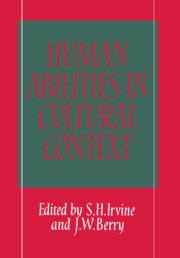Book contents
- Frontmatter
- Contents
- List of contributors
- Preface
- Acknowledgments
- Part I Human abilities in theoretical cultures
- Part II Cultural responses to ability measurement
- Part III Cultural limits upon human assessment
- 15 Native North Americans: Indian and Inuit abilities
- 16 Aboriginal cognition and psychological nescience
- 17 Testing Bushmen in the Central Kalahari
- 18 Caste and cognitive processes
- 19 Educational adaptation and achievement of ethnic minority adolescents in Britain
- 20 The diminishing test performance gap between English speakers and Afrikaans speakers in South Africa
- Author index
- Subject index
20 - The diminishing test performance gap between English speakers and Afrikaans speakers in South Africa
from Part III - Cultural limits upon human assessment
Published online by Cambridge University Press: 13 January 2010
- Frontmatter
- Contents
- List of contributors
- Preface
- Acknowledgments
- Part I Human abilities in theoretical cultures
- Part II Cultural responses to ability measurement
- Part III Cultural limits upon human assessment
- 15 Native North Americans: Indian and Inuit abilities
- 16 Aboriginal cognition and psychological nescience
- 17 Testing Bushmen in the Central Kalahari
- 18 Caste and cognitive processes
- 19 Educational adaptation and achievement of ethnic minority adolescents in Britain
- 20 The diminishing test performance gap between English speakers and Afrikaans speakers in South Africa
- Author index
- Subject index
Summary
Psychometric tests have been in use in South Africa for over half a century now in the context of personnel selection, educational assessment, and related research. The ethnocultural, linguistic, and socioeconomic heterogeneity of the South African population has afforded a rare opportunity for studying the effects of such variables on test performance. At the same time this diversity has posed daunting problems for psychometric methodologists, test constructors, and test users.
Innovative South African research on test development and use amid such diversity has attracted favourable international attention in relation to many important psychometric themes. Some of the most noteworthy contributions include Biesheuvel's (1972) work, initiated around 1950, on the construction of the General Adaptability Battery for classifying black mining recruits; Hudson's (1960, 1962) work on pictorial depth perception; studies by Mundy Castle and Nelson (1962) and Nelson (1969) involving neuropsychological assessment in an isolated community of forest workers; Reuning's (1972; Reuning & Wortley, 1973) studies on the Bushmen of the Kalahari; research by Grant (1972) and Kendall (1972) on ability structures of ethnic groups in cultural transition; Poortinga's (1971, 1972) methodological contributions to cross-cultural comparability; and J. M. Verster's (1983a) entry into computerized assessment and structural analysis of cognitive processes in different groups. But for want of space, there are many other excellent studies that could be mentioned here; as well as a large number of more routine, applied, or empirical projects involving test construction and application for a wide variety of purposes.
- Type
- Chapter
- Information
- Human Abilities in Cultural Context , pp. 534 - 560Publisher: Cambridge University PressPrint publication year: 1988
- 3
- Cited by



